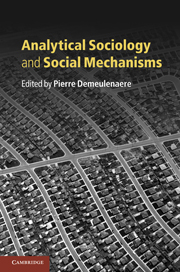Book contents
- Frontmatter
- Contents
- List of figures
- List of tables
- List of contributors
- Introduction
- Part I Action and mechanisms
- Part II Mechanisms and causality
- 5 Generative process model building
- 6 Singular mechanisms and Bayesian narratives
- 7 The logic of mechanistic explanations in the social sciences
- 8 Social mechanisms and explanatory relevance
- 9 Causal regularities, action and explanation
- Part III Approaches to mechanisms
- Index
- References
9 - Causal regularities, action and explanation
Published online by Cambridge University Press: 05 June 2012
- Frontmatter
- Contents
- List of figures
- List of tables
- List of contributors
- Introduction
- Part I Action and mechanisms
- Part II Mechanisms and causality
- 5 Generative process model building
- 6 Singular mechanisms and Bayesian narratives
- 7 The logic of mechanistic explanations in the social sciences
- 8 Social mechanisms and explanatory relevance
- 9 Causal regularities, action and explanation
- Part III Approaches to mechanisms
- Index
- References
Summary
A prisoner who has neither money nor interest, discovers the impossibility of his escape, as well when he considers the obstinacy of the gaoler, as the walls and bars with which he is surrounded; and, in all attempts for his freedom, chooses rather to work upon the stone and iron of the one, than upon the inflexible nature of the other. The same prisoner, when conducted to the scaffold, foresees his death as certainly from the constancy and fidelity of his guards, as from the operation of the axe or wheel. His mind runs along a certain train of ideas: The refusal of the soldiers to consent to his escape; the action of the executioner; the separation of the head and the body; bleeding, convulsive motions, and death; but the mind feels no differences between them in passing from one link to another.
(David Hume [1758] 1975: 90)Nineteenth-century social studies are divided over a major issue: are they similar to the study of nature, introducing laws governing individual behaviors and social outcomes; or are they intrinsically different, since there are no major regularities and laws to be found in social life? Mill (1843) argued that there was an underlying similarity between the social and the natural sciences. Dilthey (1883) by contrast declared them to be fundamentally heterogeneous, the social world being mainly historical, to be apprehended through the description of particular events, the sciences of nature being characterized by their orientation to general laws.
- Type
- Chapter
- Information
- Analytical Sociology and Social Mechanisms , pp. 173 - 198Publisher: Cambridge University PressPrint publication year: 2011
References
- 9
- Cited by



